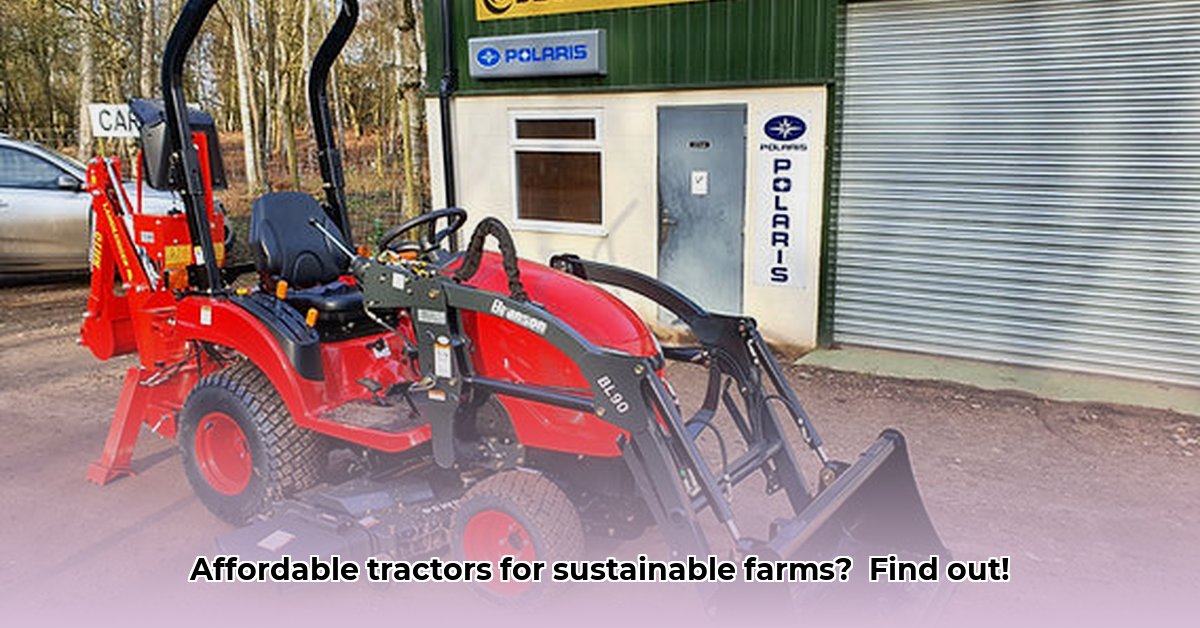
Buying a tractor is a significant investment, especially for sustainable farms. This buyer's guide helps you navigate the market to find an affordable and reliable sub-compact tractor that meets your needs. We'll compare brands, explore cost-saving strategies, and offer expert advice to empower your purchasing decision. Whether you're a seasoned farmer or just starting out, this guide will help you select a tractor that aligns with your budget and sustainability goals. For more detailed information on choosing the right size, check out this helpful resource: Choosing the right tractor size.
Power and Performance: Choosing the Right Horsepower
Horsepower determines your tractor's capabilities. Sub-compact tractors typically range from 16 to 25 horsepower (HP). Think of it as the engine size in a car. More HP means more power for demanding tasks like moving heavy loads or tilling tough soil. If your work mostly involves mowing or light tilling, a lower HP model might suffice, saving you money. However, don't underpower your needs. Carefully consider your usual tasks; an honest assessment will guide you to the right HP rating.
Key Features: Beyond the Basics
Beyond horsepower, essential features matter. A power take-off (PTO) (the connection point for attachments like mowers and tillers) is crucial for expanding your tractor's functionality. A heated cab (enclosed operator station with climate control) enhances comfort, particularly in colder climates, but increases the cost. Before buying, check implement compatibility. Some tractors work better with certain attachments than others. This compatibility influences the tractor's overall value.
Budget and Pricing: Finding Value
New sub-compact tractors typically cost between $15,000 and $20,000. However, prices vary based on brand, features, and attachments. Buying used might save money, but it involves more risk. Thoroughly inspect any used tractor for potential issues. Used tractor prices fluctuate due to local supply and demand. Remember, the cheapest option isn't always the best value. Consider long-term costs like maintenance, fuel efficiency, and potential repairs.
Step-by-Step Guide to Finding Your Perfect Tractor
Follow these steps for a successful tractor purchase:
Assess Your Needs: Honestly evaluate your tasks. How many acres will you cover? What attachments will you use? This prevents buying an unsuitable tractor.
Set a Realistic Budget: Include initial purchase price, maintenance, fuel, and potential repairs. Add a buffer for unexpected costs.
Research Tractor Models: Explore different models, comparing horsepower, features, and prices. Review online reviews for reliability and performance insights.
Read Reviews and Seek Recommendations: Online reviews and testimonials offer invaluable insights. Consult local farmers for advice based on their experience.
Test Drive (If Possible): Test driving allows you to assess controls and handling. If possible, make this a crucial step.
Compare Financing Options: Explore financing from dealers or lenders for the best loan terms.
Buy from a Reputable Dealer: Choose a dealer with strong service and support for post-purchase assistance.
Sustainability: Farming Responsibly
Smaller tractors contribute to sustainable farming. They cause less soil compaction than larger machines, benefiting soil health and crop yields. Sub-compact tractors are also typically more fuel-efficient, reducing your environmental impact. Buying used reduces the demand for new manufacturing, further promoting sustainability.
Pros and Cons of Sub-Compact Tractors
| Feature | Pros | Cons |
|---|---|---|
| Affordability | Lower upfront cost. | May require more frequent maintenance. |
| Maneuverability | Excellent for tight spaces and smaller fields. | Limited lifting capacity. |
| Fuel Efficiency | Lower fuel consumption, reducing operating costs and impact. | Not suitable for large-scale operations. |
| Versatility | Wide range of attachments available. | Power limitations restrict the use of some larger and heavier implements. |
How to Choose Sustainable Sub-Compact Tractors for Small Farms
Key Takeaways:
- Sub-compact tractors (17-25 HP) are ideal for small farms, perfect for mowing, light hauling, and snow removal.
- Brand reputation significantly affects resale value. John Deere and Kubota are generally well-regarded.
- Pricing varies greatly; compare thoroughly.
- Consider farm-specific needs: terrain, climate, and required implements.
- Factor in long-term maintenance and parts availability. Choose a dealer with strong local support.
- Prioritize fuel efficiency and reduced soil compaction for sustainability.
[1] Tractor Zoom. (2025, April 7). The Best Sub-Compact Tractors for Your Money. https://tractorzoom.com/equipment/tractors/the-best-sub-compact-tractors-for-your-money